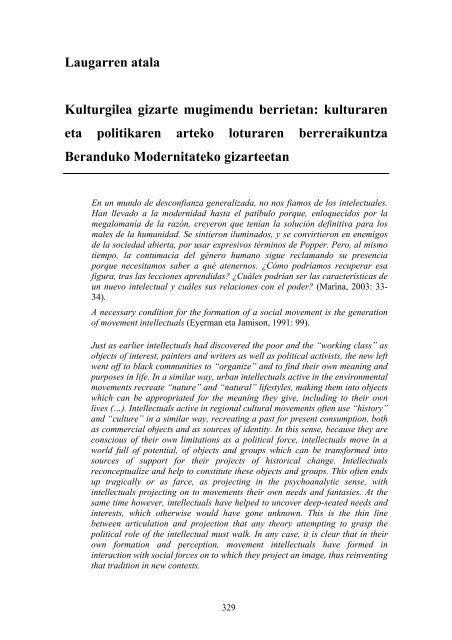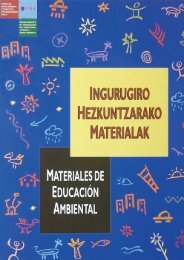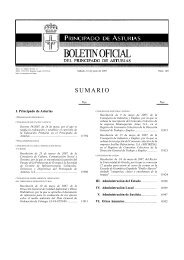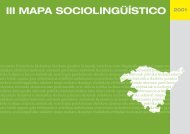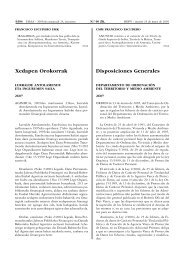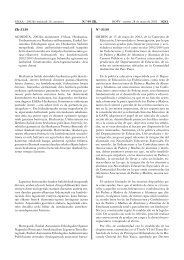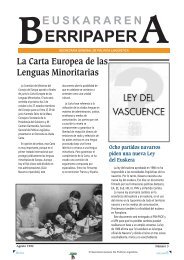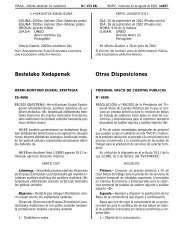- Page 1 and 2:
Jakintza-arloa: Soziologia Kulturgi
- Page 3 and 4:
gintuen gertuko errealitatearen ana
- Page 5 and 6:
KULTURGINTZA ESPARRUKO ERAGILEEN TR
- Page 7 and 8:
Eskerronak Doktore tesi batean urte
- Page 9 and 10:
Aurkibidea Sarrera.................
- Page 11 and 12:
5.1.2.3. Botere politikoaren ohiko
- Page 13 and 14:
Sarrera ___________________________
- Page 15 and 16:
esparrutik erabat desagertu direnik
- Page 17 and 18:
jabe egin ditu gizarte eragile batz
- Page 19:
ororen gainetik, gizarte mugimendua
- Page 22 and 23:
egiten die zergatik diren gauzak ha
- Page 24 and 25:
horrela, gizartearen ezagutza oroko
- Page 26 and 27:
ezagutzaren sortzaile eta eramaile
- Page 28 and 29:
sinbolikoen arteko gatazka, gehiene
- Page 30 and 31:
gutxiengo pribilegiatuak. Hartara,
- Page 32 and 33:
ati buruzko partaidetza sentimendua
- Page 34 and 35:
partaidetza eta nortasun sentimendu
- Page 36 and 37:
akarra zen. Zientziak, alegia, arra
- Page 38 and 39:
Horrenbestez, integrazio kognitiboa
- Page 40 and 41:
horrenbesteko agintaritza eskuratu
- Page 42 and 43:
faktore elkartu dira osaketa horret
- Page 44 and 45:
dagokienez. 8 Ildo horretan, era as
- Page 46 and 47:
definitzailearen paradoxa besterik
- Page 48 and 49:
Behin baino gehiagotan ikuspegi ind
- Page 50 and 51:
ditu, eta horien artean arte guztie
- Page 52 and 53:
“Zerbitzu sektorea”, “sektore
- Page 54 and 55:
Arestian aipatu den legez, klaseeta
- Page 56 and 57:
ikuspegian, non edo non klaseen art
- Page 58 and 59:
intelektualei buruz egindako hainba
- Page 60 and 61:
ideologoek eta adituek funtzio desb
- Page 62 and 63:
erriz, helburuekiko egintza raziona
- Page 64 and 65:
Ikuspegi kulturalistan, intelektual
- Page 66 and 67:
Beste batzuetan, intelektualak zeha
- Page 68 and 69:
engaiamendu politikoa. Zedarritze a
- Page 70 and 71:
Hala eta guztiz ere, intelektualek
- Page 72 and 73:
den eragile gisa definitzen da inte
- Page 74 and 75:
jardueraren arabera intelektualeria
- Page 76 and 77:
“historizatzeak” halabeharrez e
- Page 78 and 79:
Dohain naturalaren ezaugarria erant
- Page 80 and 81:
uruzko hausnarketa guztiek era hone
- Page 82 and 83:
perspektiban txertaturik ulertzeko
- Page 84 and 85:
esteko orekak eragiten dituzte aldi
- Page 86 and 87:
Historian bezala, soziologian ere e
- Page 88 and 89:
Irudikapen horretan, gizakiek, eure
- Page 90 and 91:
fundamento de las representaciones
- Page 92 and 93:
Eliasen konfigurazioaren ondoan Bou
- Page 94 and 95:
askotariko atalak kontuan hartzen b
- Page 96 and 97:
Halaber, esparruak ez dauka ez zati
- Page 98 and 99:
Hartara, intelektualei buruzko azte
- Page 100 and 101:
garatuz. Gure harremanezko interpre
- Page 102 and 103:
ahalbidetzen duen tresna analitikoa
- Page 104 and 105:
erabakigarria daukala kulturgileen
- Page 106 and 107:
monopolioa. Zehazki esateko, sortze
- Page 108 and 109:
kulturak, ordea, bateratzaile nahi
- Page 110 and 111:
Ordea, Durkheimek aipatutako ideia
- Page 112 and 113:
Es en el proceso de constitución d
- Page 114 and 115:
esparrua. Baina, halaz ere, egitura
- Page 116 and 117:
egindako iruzkinek erakusten digute
- Page 118 and 119:
eskakizunekin hausturak burutu ahal
- Page 120 and 121:
hasi ziren independentzia balioak p
- Page 122 and 123:
ginoan, kapital ekonomikoaren jabet
- Page 124 and 125:
Desberdintasun horren karietara, be
- Page 126 and 127:
duten arren, kulturgintzaren esparr
- Page 128 and 129:
Hartara, une batean kulturaren espa
- Page 130 and 131:
Harremanen bilbean gertatu daitezke
- Page 132 and 133:
daramatzate eurekin batera gehienet
- Page 134 and 135:
izaten den. 47 Pertenentzia eskubid
- Page 136 and 137:
eskuratzen dituzten baliabideak ez
- Page 138 and 139:
La interiorización implica, pues,
- Page 140 and 141:
Habitusaren kontzeptuak egintzaren
- Page 142 and 143:
gizabanakoaren gain kokatzen dira e
- Page 144 and 145:
igarren mailako natura hori habitus
- Page 146 and 147:
eragileentzat, azken horiek ikusten
- Page 148 and 149:
esparru jakin bat mundu esanguratsu
- Page 150 and 151:
zehatzean. Harexek ematen die zentz
- Page 152 and 153:
Esparruaren logikaren barruan sartz
- Page 154 and 155:
kontzientzia izatea. Horrela, egink
- Page 156 and 157:
zeregin praktikoetatik aske utzitak
- Page 158 and 159:
scholéari atxikitako pentsamoldear
- Page 160 and 161:
ahal dira gogoetarako. Baina, jolas
- Page 162 and 163:
antzeko gogoeta egin daiteke garaik
- Page 164 and 165:
atzuekin batera. 62 Common knowledg
- Page 166 and 167:
En un plano está el marco de las c
- Page 168 and 169:
izari objektibo eta egiturazkoa. Ha
- Page 170 and 171:
lo que importa es cómo se valora
- Page 172 and 173:
aliabideen beste edozein banaketa b
- Page 174 and 175:
nolabaiteko gizarte aintzatespena.
- Page 176 and 177:
Jarduera intelektuala hizkuntza tru
- Page 178 and 179:
eragile batzuei. Egoera hori, ordea
- Page 180 and 181:
errealitatea behin betirako egina b
- Page 182 and 183:
definizioa eta sorrera. 68 Baina, h
- Page 184 and 185:
oterearen ondorioa besterik ez da e
- Page 186 and 187:
Botere sinbolikoak adierazpen eta m
- Page 188 and 189:
kultura esparruaren barruan da lehe
- Page 190 and 191:
duten tresnak egoten baitira jokoan
- Page 192 and 193:
Ikuspegi ideal batetik abiatuta, in
- Page 194 and 195:
egungo erakunde politikoetan lanket
- Page 196 and 197:
eta kontzientean aritzeko beste era
- Page 198 and 199:
Bestalde, intelektuala esparru poli
- Page 200 and 201:
Gizarte batetik bestera kultura esp
- Page 202 and 203:
Alde batera edo bestera lerrokatuz
- Page 204 and 205:
Era berean, kulturaren eta gizartek
- Page 206 and 207:
Hirugarren atala Kultura esparruare
- Page 208 and 209:
intelektuala. Halatan, tradizioak e
- Page 210 and 211:
Azterketa teorikoetan intelektualei
- Page 212 and 213:
irabazitako autonomia, baita eragot
- Page 214 and 215:
sinbolikoen trukean jasotzen dira e
- Page 216 and 217:
sozialaren berme bihurtzen dira. Ho
- Page 218 and 219:
karietara ulertu behar da enpresa z
- Page 220 and 221:
erakundeak aztertzen dituenean, ald
- Page 222 and 223:
hala modu kuantitatiboan nola estra
- Page 224 and 225:
kokatutako kulturgileak ere. Bestal
- Page 226 and 227:
unibertsitateak pentsamendu bera pa
- Page 228 and 229:
habitusak bideratzen baitu kultura
- Page 230 and 231:
zeuden indar harremanak bestelakotu
- Page 232 and 233:
nolakotasuna. 86 Indar baliabideak
- Page 234 and 235:
kultura sistema partikular bat erat
- Page 236 and 237:
zuzenean edo zeharka— etengabe ur
- Page 238 and 239:
dauden erakundeak, beraz, kultura l
- Page 240 and 241:
3. Kultura eragilea instituzio buro
- Page 242 and 243:
hartu gabe 91 . Eta, alderantziz er
- Page 244 and 245:
Aro Modernoan azaleratu diren indar
- Page 246 and 247:
eragin zituzten estatuaren eskakizu
- Page 248 and 249:
Modu arketipiko batean, esan daitek
- Page 250 and 251:
Hauteman ere ekoizpen sinbolikoaren
- Page 252 and 253:
guztiek berebiziko ahalmena daukate
- Page 254 and 255:
Bestalde, kultura eta hizkuntza bat
- Page 256 and 257:
aliabide sinbolikoen partiketa orek
- Page 258 and 259:
Bere publikoarekin ezarritako komun
- Page 260 and 261:
lehenagoko botere feudalen desinteg
- Page 262 and 263:
Bistakoa denez, Aro Modernoan jazot
- Page 264 and 265:
gizarte ikusgaitasuna hedabideak ar
- Page 266 and 267:
ehar izan du— eta entzuterik onen
- Page 268 and 269:
irdefinizio sakona eragin du esparr
- Page 270 and 271:
únicamente a los imperativos intel
- Page 272 and 273:
edo hausnarketarako baldintzarik be
- Page 274 and 275:
ezagutaraziz, politikoki pentsa dai
- Page 276 and 277:
Gizarteak ez dauka “kontzientzia
- Page 278 and 279:
Gizartearen irudikapenen eraikuntza
- Page 280 and 281:
publikoaren gai-zerrenda ezartzen d
- Page 282 and 283: gizarte baldintza eta kultura abagu
- Page 284 and 285: Interpretazioak interpretazio, ezin
- Page 286 and 287: Zer dakar zehazki desmitifikatzaile
- Page 288 and 289: ebatzi dute. Planteamendu berrien l
- Page 290 and 291: Ziurgabetasunak saihestea ezinezkoa
- Page 292 and 293: eragin ditu haren nolakotasunari bu
- Page 294 and 295: arabera, zientziak Jaungoikoa egiaz
- Page 296 and 297: Halatan, jakin dezakegu faltsua zer
- Page 298 and 299: Halaz ere, aurkikuntza horiek ez da
- Page 300 and 301: Je ne pense pas que la raison soit
- Page 302 and 303: horrela, zientzigintza gizarte egin
- Page 304 and 305: iturriak. Ikuspegi historiko bateti
- Page 306 and 307: eskuineko ohiko ikusmolde politiko-
- Page 308 and 309: komunitateak eta familiak, besteak
- Page 310 and 311: zeukan zerikusirik XIX. mende amaie
- Page 312 and 313: politikoa erabat murrizten zuen kul
- Page 314 and 315: era horretako jarreraren zantzuak a
- Page 316 and 317: Politika ulertzeko eredu berria sor
- Page 318 and 319: desitxuratu egiten du gaur egungo k
- Page 320 and 321: Aurreko orrialdeetan Modernitatean
- Page 322 and 323: mendeko agertu zen eta, luzaroan, b
- Page 324 and 325: premiaren auzia saihestezina dela e
- Page 326 and 327: aldarrikapen sektorialetan galtzeko
- Page 328 and 329: Modernitatean. Ildo horretan, azken
- Page 330 and 331: Horrenbestez, gizarte mugimendu ber
- Page 334 and 335: krimena, eta, ororen gainetik, lang
- Page 336 and 337: Bestalde, kontuan hartzen badugu di
- Page 338 and 339: 60ko hamarraldiak aldaketa batzuk e
- Page 340 and 341: politologoek egindako azterketetan
- Page 342 and 343: kideak. Bestalde, beraien egintzeta
- Page 344 and 345: jardunean jasaten dituzten arazo es
- Page 346 and 347: uruzko ikusmolde teknokratikoa eta
- Page 348 and 349: antolaketaren eta erabaki estrategi
- Page 350 and 351: ikertzen ahalegindu dira, alegia, m
- Page 352 and 353: They find themselves free only to c
- Page 354 and 355: Melucciren azterketaren arabera, no
- Page 356 and 357: Zenbait autorek nabarmendu dute bad
- Page 358 and 359: amerikarrek, hau da, baliabideen mo
- Page 360 and 361: esos contextos históricos como de
- Page 362 and 363: 2.1. Interpretazio markoen azterket
- Page 364 and 365: markoek, multzoan hartuta, taldeare
- Page 366 and 367: (to frame) darabilte Snowek eta Ben
- Page 368 and 369: Lehenengo urratsari dagokionez, mug
- Page 370 and 371: pertzepzioa ahalbidetzen baitute. D
- Page 372 and 373: gehiago, erreferentzi markoen osake
- Page 374 and 375: atzuen adierazpen modura interpreta
- Page 376 and 377: egun inork ez du eztabaidan jartzen
- Page 378 and 379: Mugimendua esparru gisa ulertzen ba
- Page 380 and 381: Horiek horrela, aukera politikoek n
- Page 382 and 383:
Ikuspegi murriztaile hori gainditu
- Page 384 and 385:
legitimitatea transferitzen diete s
- Page 386 and 387:
ulertzeko beharrezkoa izango da mug
- Page 388 and 389:
hartara, porrot egitetik gertu daud
- Page 390 and 391:
cultural dimension of human action
- Page 392 and 393:
Arestian esan den bezala, hezkuntza
- Page 394 and 395:
kolektiboan eragiten dute, egunerok
- Page 396 and 397:
(Inglehart, 1991: 420). Inglehartek
- Page 398 and 399:
zientifikodun zein zientifikorik ga
- Page 400 and 401:
esperimental modura, Bretainia Hand
- Page 402 and 403:
legitimoek modu ikusgarrian egiten
- Page 404 and 405:
potentzialki— gaitasun berriak es
- Page 406 and 407:
handia metatzen duten gune sozial i
- Page 408 and 409:
En la medida en que somos sujetos,
- Page 410 and 411:
egintzen eragina ere ezin da pareko
- Page 412 and 413:
daukan kokapenaren, kapitalaren eta
- Page 414 and 415:
intelektualak 169 . Gizarte moderno
- Page 416 and 417:
While the validity (what might be c
- Page 418 and 419:
erekoak izaten. Orobat, batari eta
- Page 420 and 421:
aitira. 171 Ildo horretatik, ezagut
- Page 422 and 423:
gaur egun. Kontzeptuak jariakortasu
- Page 424 and 425:
Ezin dugu ahaztu gizarte mugimendua
- Page 426 and 427:
teoriatik egintzarako bidea, dibulg
- Page 428 and 429:
Halaz ere, mugimendu intelektual gi
- Page 430 and 431:
zuzendurik dauden errealitatearen i
- Page 432 and 433:
hainbat erakunde eta tradiziotan ja
- Page 434 and 435:
porque los actores son crecientemen
- Page 436 and 437:
gizarte ordena arbitrario eta histo
- Page 438 and 439:
daitezke tartean dauden faktore sin
- Page 440 and 441:
globalizatuan. Izan ere, kulturen e
- Page 442 and 443:
erezko zereginetan. Hala, badaude,
- Page 444 and 445:
dauzkan zailtasunak kontuan hartuta
- Page 446 and 447:
agertzen dira, askotariko neurri et
- Page 448 and 449:
nacionalismo moderno, lenguaje y si
- Page 450 and 451:
lingüísticos que supone una subve
- Page 452 and 453:
motivo, el idioma, a través de la
- Page 454 and 455:
kulturaren eta hizkuntzaren estatus
- Page 456 and 457:
453
- Page 458 and 459:
Euskarari buruzko atxikimenduan eta
- Page 460 and 461:
ilakaeran eragiten duten faktore so
- Page 462 and 463:
hori hizkuntza nagusiaren nahiz men
- Page 464 and 465:
menderatuak eta menderatzaileak, le
- Page 466 and 467:
akoitzaren botere mailan—. Horiek
- Page 468 and 469:
indibidualen artean, bai eragile ko
- Page 470 and 471:
nagusietarikoa bere hastapenetan, a
- Page 472 and 473:
abolizioaren osteko Hegoaldean, hai
- Page 474 and 475:
apostua egin izan ondoren hartatik
- Page 476 and 477:
kulturaren eta hizkuntzaren legitim
- Page 478 and 479:
Egungo euskalgintzaren esparru kogn
- Page 480 and 481:
Nazionalismoaren eta kultura mugime
- Page 482 and 483:
nabarmena zen nafar kulturgileek de
- Page 484 and 485:
gutxiespena, irakaskuntza sistema a
- Page 486 and 487:
zehaztuta dago Aranaren aburuz. Eus
- Page 488 and 489:
1.1.2. Pizkundearen modernotasuna J
- Page 490 and 491:
Harrezkero, orientazio zientifiko e
- Page 492 and 493:
nortasun kultural berriak eratzeko
- Page 494 and 495:
zein antzerkigintzan ekoizpen jasor
- Page 496 and 497:
eta ezin izan zen euskaldundu Pizku
- Page 498 and 499:
Euskal Autonomi Estatutuan jasotako
- Page 500 and 501:
gizaldietan metaturiko kultura oino
- Page 502 and 503:
aldaketa ekonomiko, sozial edo poli
- Page 504 and 505:
funtsezko osagai bilakatu zen. Hizk
- Page 506 and 507:
gaztearen protagonismo gero eta han
- Page 508 and 509:
Ezaguna da nazionalismoaren azterke
- Page 510 and 511:
estos sectores con la clase obrera
- Page 512 and 513:
mugimenduaren barnean landu zen eta
- Page 514 and 515:
marxismoari atxikitu zitzaion eta,
- Page 516 and 517:
sinfonía es el producto armónico
- Page 518 and 519:
filósofos, dramaturgos, actores, c
- Page 520 and 521:
eta, bestetik, euskal kulturaren bi
- Page 522 and 523:
Arantzazuko bilerara deitu zuenean,
- Page 524 and 525:
gizarte mugimenduaren izaera hartu
- Page 526 and 527:
ekarri zuen, bereziki bi arrazoiren
- Page 528 and 529:
Bilakaeraren emaitzetako bat AEK 26
- Page 530 and 531:
Zientzietan, lehenengo ikerkuntza-k
- Page 532 and 533:
kezka jaso zuen gogoeta mailan beza
- Page 534 and 535:
erresistentzia nazionalistaren jard
- Page 536 and 537:
abertzaletasun eraberrituaren hegem
- Page 538 and 539:
garapenak berak sortu zuen agertoki
- Page 540 and 541:
hizkuntzaren gain ezarritako biolen
- Page 542 and 543:
gizartekide arrunten sen oneko ezag
- Page 544 and 545:
ezala, belaunaldi berrien etorrerak
- Page 546 and 547:
alfabetatzeak bidea eman zuten best
- Page 548 and 549:
zaharreko indar faktikoek bildutako
- Page 550 and 551:
alu —Nafarroaren kasuan, baina, h
- Page 552 and 553:
mekanismoen bidez hezurmamitzen da
- Page 554 and 555:
kultura mugimenduaren behinolako eg
- Page 556 and 557:
Ikertzaile zenbaiten hitzetan, abad
- Page 558 and 559:
sinbolikorako eta egintza politikor
- Page 560 and 561:
unibertsoa ere. Era berean, institu
- Page 562 and 563:
. Horietatik batzuek unibertsitatea
- Page 564 and 565:
(…) nire ustez jakintza mota guzt
- Page 566 and 567:
ai, orduan dana. Orduan horrek …,
- Page 568 and 569:
Testuinguru sozio-historikoak ez ez
- Page 570 and 571:
zehar sorterriko elite kulturadunek
- Page 572 and 573:
Esparrua osatzeko azken fasea, bene
- Page 574 and 575:
Izan ere, esparru kontzeptuaren bid
- Page 576 and 577:
Nik uste det, batetik, bereiztu beh
- Page 578 and 579:
aukerak eta desberdinak izango dira
- Page 580 and 581:
eno, garbi dago tokian tokiko jardu
- Page 582 and 583:
isiltasuna eta axolagabetasuna izan
- Page 584 and 585:
duela, ez? Superbibentzia instintoa
- Page 586 and 587:
alderdia, hizkuntza bera batu, mode
- Page 588 and 589:
militantismoa kulturaren aldekoa ga
- Page 590 and 591:
mugimenduan eratutako erakundeetan
- Page 592 and 593:
erabakigarria izan dela. Kultur era
- Page 594 and 595:
autokonfidantza funtzio hori, ze eu
- Page 596 and 597:
ezpada kulturgintzan dihardutelako.
- Page 598 and 599:
har, Francoren errejimenaren aurkak
- Page 600 and 601:
inportanteena ekologia bada, politi
- Page 602 and 603:
ikastolak, AEK alfabetatze mugimend
- Page 604 and 605:
nork antolatzearen arabera ba gizar
- Page 606 and 607:
esparruan dauzkaten kokapenak eta h
- Page 608 and 609:
eta aurrekoak bereizi nahian. Horre
- Page 610 and 611:
autonomikoek jasotako eskuduntzek b
- Page 612 and 613:
daukate esperientzi maila urte batz
- Page 614 and 615:
nahiz eta zenbaitetan ez duten bate
- Page 616 and 617:
Dibulgazioaren dimentsio politikoa
- Page 618 and 619:
kognitiboak. Txepetxen teoriaren ar
- Page 620 and 621:
atzuekiko daukan isiltasuna. Nik us
- Page 622 and 623:
funtsatzen da. Lehenbiziko ideia da
- Page 624 and 625:
Abiapuntua indibiduoa da. Ailegapun
- Page 626 and 627:
Euskara teknikariek eta, oro har, p
- Page 628 and 629:
zituzten arazoak konpontzeko. Eta b
- Page 630 and 631:
duela euskara elkarteen, AEDren sor
- Page 632 and 633:
zuzenean lotuta dago hizkuntzaren a
- Page 634 and 635:
kulturgileek landu dituzten interpr
- Page 636 and 637:
at ezarri da esparruaren barruan. B
- Page 638 and 639:
cuarto de cms más” beharko genuk
- Page 640 and 641:
ilakaeran mezu subliminal hori —
- Page 642 and 643:
orduan oso argi ikusi baitzen aldak
- Page 644 and 645:
Nik uste dut (…) Euskal Unibertsi
- Page 646 and 647:
EHUn burututako prozesua, beste uni
- Page 648 and 649:
zientziek hartzen duten garrantzia
- Page 650 and 651:
Zenbat ikerketa lerro daude interes
- Page 652 and 653:
aina, bueno abiatu zen Soziolinguis
- Page 654 and 655:
lotura dutenak zenbait herrigintzan
- Page 656 and 657:
Bestalde, akademikoak badaki uniber
- Page 658 and 659:
hertsapena esparruaren logikaren ba
- Page 660 and 661:
unibertsitatean. Unibertsitatean ar
- Page 662 and 663:
alizko ordainsari sinboliko paralel
- Page 664 and 665:
2.4.2. Mugimendutik administraziora
- Page 666 and 667:
adut Kontseiluaren sorreran, ni kul
- Page 668 and 669:
aliabide gutxirekin abiatu ziren ad
- Page 670 and 671:
horiek garai jakin batean euskalgin
- Page 672 and 673:
gauzak, ezta? Eta baten batek esang
- Page 674 and 675:
Nik uste det…, bueno militantzia
- Page 676 and 677:
Ondorioak _________________________
- Page 678 and 679:
hutsa baino askoz ere prozesu korap
- Page 680 and 681:
erakunde politikoetako ideologoek
- Page 682 and 683:
arrazoia hiztun komunitatearen gora
- Page 684 and 685:
politikoek eta sozioekonomikoek ast
- Page 686 and 687:
euskalduntzeko erakundeak, argitale
- Page 688 and 689:
kulturalen inguruan sortutako eztab
- Page 690 and 691:
Hartara, euskalgintzako kulturgilee
- Page 692 and 693:
orekatu dute politikarien erantzuki
- Page 694 and 695:
* ALVAREZ JUNCO, J. (1994): “Movi
- Page 696 and 697:
* AZURMENDI, J. (1998): Oraingo Gaz
- Page 698 and 699:
* BELTRAN, M. (2004): La Estructura
- Page 700 and 701:
* BOURDIEU, P., WACQUANT, L. (1992)
- Page 702 and 703:
* CHAMPAGNE, P. (1998): “La Doble
- Page 704 and 705:
* DURKHEIM, E. (1977): Las Reglas d
- Page 706 and 707:
* FERNANDEZ RAÑADA, A. (1998) :
- Page 708 and 709:
* GIDDENS, A. (1994 a): Las Consecu
- Page 710 and 711:
* HABERMAS, J. (1986 b): Problemas
- Page 712 and 713:
* IZTUETA, P. (1996): Intelligentsi
- Page 714 and 715:
* KLANDERMANS, B., TARROW,S. (1988
- Page 716 and 717:
* LARRAÑAGA, I.. (1987): “Euskal
- Page 718 and 719:
* LLOBERA, J.R. (2001): “La Forç
- Page 720 and 721:
* McADAM, D. (1999 b): “Marcos In
- Page 722 and 723:
* MOLLÀ, T. (arg.) (1998): La Pol
- Page 724 and 725:
* OLAZIREGI, M.J. (2003): “Bizent
- Page 726 and 727:
* RAMOS TORRE, R. (1995): “La For
- Page 728 and 729:
* SAMPEDRO, V., JEREZ, A., LOPEZ, J
- Page 730 and 731:
* SIGUAN, M. (1988): “Posibilidad
- Page 732 and 733:
* URLA, J. (1987): Being Basque, Sp
- Page 734:
* ZALD, M.N. (1992): “Looking Bac


